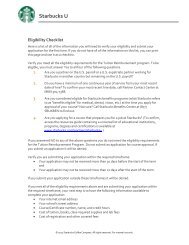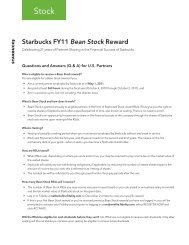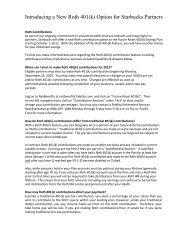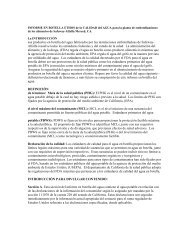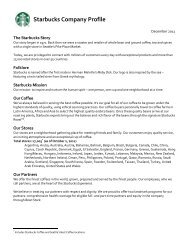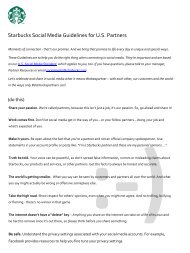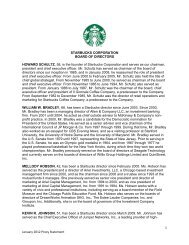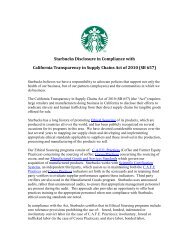Starbucks Corporation CORPORATE SOCIAL RESPONSIBILITY ...
Starbucks Corporation CORPORATE SOCIAL RESPONSIBILITY ...
Starbucks Corporation CORPORATE SOCIAL RESPONSIBILITY ...
You also want an ePaper? Increase the reach of your titles
YUMPU automatically turns print PDFs into web optimized ePapers that Google loves.
OUR COMMITMENT TO<br />
ENVIRONMENTAL STEWARDSHIP<br />
<strong>Starbucks</strong> commitment to contribute positively<br />
to the environment is a guiding Principle of our<br />
company. Ever since , when we established<br />
<strong>Starbucks</strong> Environmental Mission Statement,<br />
we have been expanding our definition of what<br />
environmental responsibility means within the<br />
context of our growing and increasingly more<br />
complex business.<br />
In this section we describe the initiatives we have undertaken<br />
to be good environmental stewards, and report on our<br />
performance in this area. Specific topics covered include:<br />
• <strong>Starbucks</strong> climate change mitigation strategy<br />
– Purchasing renewable energy<br />
– Saving energy<br />
– Joining together with others to raise awareness of<br />
climate change<br />
• Reducing the environmental impacts of our cups<br />
• Understanding and improving our environmental<br />
footprint<br />
– Greening the store through design<br />
– Greening store operations<br />
– Waste and recycling<br />
• Looking to our supply chain: sustainable packaging<br />
• Portrait of a typical <strong>Starbucks</strong> store<br />
– Energy and water use<br />
Addressing Climate Change<br />
The potentially disruptive changes in the earth’s climate due<br />
to an increase in greenhouse gases (GHG) in the atmosphere<br />
is a major concern for our company, our customers, our<br />
business partners and other stakeholders. We agree with the<br />
consensus of the scientific community that climate change<br />
could pose an enormous threat to the future of our planet.<br />
<strong>Starbucks</strong> core business is high-quality coffee, an agricultural<br />
product that flourishes in tropical microclimates around the<br />
globe. Climatic conditions influence the yield and quality<br />
of coffee crops. We are concerned that climate change could<br />
threaten the production of high-quality coffee crops and<br />
ultimately impact our business.<br />
<strong>Starbucks</strong> believes that governments, organizations and<br />
individuals have a responsibility to take meaningful action<br />
to reduce GHG emissions, regardless of the scale of their<br />
contribution to the issue. We have been working to better<br />
understand the risks of climate change for our business, and<br />
identify measures we can take to mitigate those risks.<br />
E N V I R O N M E N T<br />
Since 1992, <strong>Starbucks</strong> has been evolving and implementing<br />
an environmental strategy focused in part on the stewardship<br />
of key coffee-growing regions. We revamped our coffeebuying<br />
practices several years ago to include specific criteria<br />
for environmental preservation of these areas. We believe<br />
this approach will help to support and encourage ecological<br />
stability and resilience in coffee-growing areas across the globe.<br />
To address other aspects of our business operations, <strong>Starbucks</strong><br />
established a three-year climate change mitigation strategy<br />
focused on:<br />
1. Purchasing renewable energy<br />
2. Focusing on energy conservation<br />
3. Advocating the need for collaborative action<br />
We selected these areas by analyzing our greenhouse gas<br />
footprint and identifying the points of greatest leverage in our<br />
own operations and in the global community. We are now in<br />
the second year of implementing the strategy. Our progress is<br />
described throughout this section.<br />
<strong>Starbucks</strong> Greenhouse Gas Emissions<br />
In 2004, we conducted an inventory of our 2003 GHG<br />
emissions as part of a broader effort to better understand and<br />
quantify our environmental footprint. We used the World<br />
Resources Institute Greenhouse Gas Protocol to conduct the<br />
inventory of major emissions from our company-operated<br />
retail stores, coffee roasting, administrative operations and<br />
distribution network. We did not include our international<br />
retail operations or other businesses. The inventory found<br />
that 81 percent of our GHG emissions are attributable to<br />
electricity purchased for use in our stores, while 18 percent<br />
comes from coffee roasting. We have used the inventory to<br />
guide development of our climate change strategy. Our focus<br />
is on emission sources under our direct control, primarily<br />
electricity used in our stores and coffee roasting (Scope 1 and<br />
2 in the WRI Protocol).<br />
Purchased<br />
electricity<br />
81%<br />
2003 Baseline Greenhouse Gas Emissions – Scope 1 and 2<br />
Coffee roasting and<br />
natural gas<br />
18%<br />
Company-owned<br />
vehicles and<br />
aircraft<br />
1%



